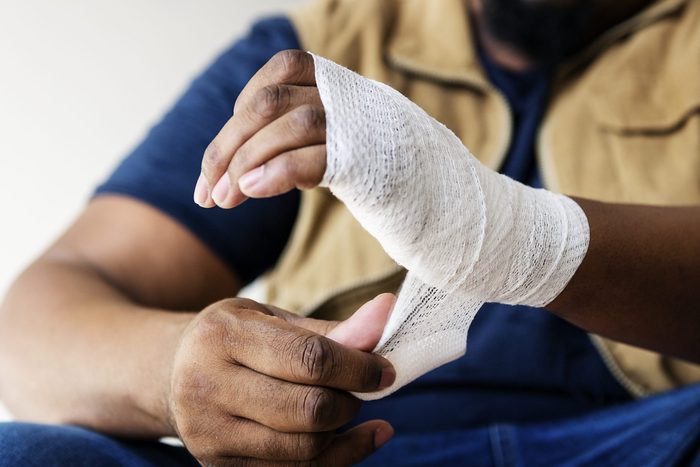
July is the month when summer entertainment peaks, but it’s also the season when as healthcare practitioners, we see a surge in hand injuries. From dreaded cases of the infamous “avocado hand” to grilling mishaps, it’s essential to stay vigilant and protect your precious digits.
As the firecrackers get poppin’, here are expert insights from top hand surgeons to ensure a safe summer.
5 Diet Changes You Should Make Before Summer, from a Nutritionist
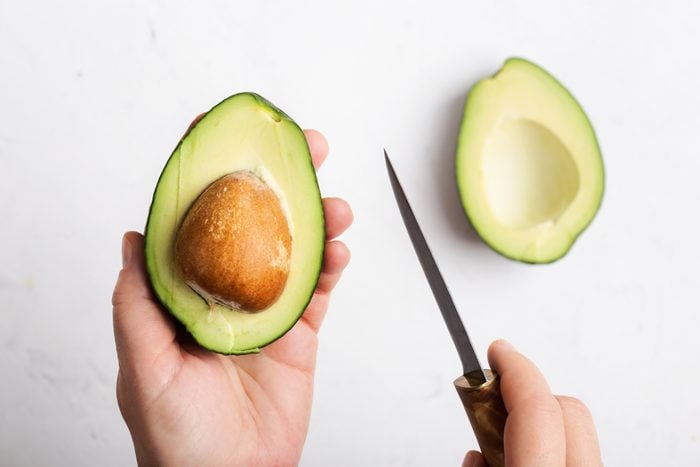
1. Avocado hand
Scott Wolfe, MD, an orthopedic surgeon specializing in upper extremity care at the Hospital for Special Surgery in New York, highlights a hidden adversary in a 2018 op-ed piece: The avocado.
Dr. Wolfe reveals the dangerous error many people commit: “The number one mistake people make is holding the avocado in their hand and cutting it toward their palm.” This means it’s risky to slice an avocado while you’re holding it, as you may accidentally slice through the soft peel and cut your hand.
Our hands are home to a complex network of vital tendons, nerves, and vessels. An accidental slice could damage these important structures. Most frequently, the tendons and nerves get injured, which Dr. Wolfe stresses “require urgent surgical repair.”
Furthermore, it’s crucial to note that hand injuries account for 25% of surgical emergencies. So, if you suffer a deep cut in the kitchen that causes heavy bleeding or notice immediate numbness in one or more fingers or an inability to bend a finger, you need to head to the emergency room immediately.
Dr. Wolfe’s tips for safely cutting an avocado? He advises placing the avocado on a cutting board and pressing down on it with an open hand. Use a knife to make a cut along the side while gently rotating it, ensuring a full 360-degree cut around the pit. Rotate the avocado by 90 degrees and make another cut, so you end up with quarters. This method makes it effortless to separate the quarters from the pit. You can then either peel the skin or scoop out the fruit with a spoon. (And whatever you do, don’t use a knife to whack into the avocado pit as a means of removing it. A spoon comes in handy for this, too.)
The 5 Healthiest Concession Stand Foods, According to a Certified Nutrition Coach
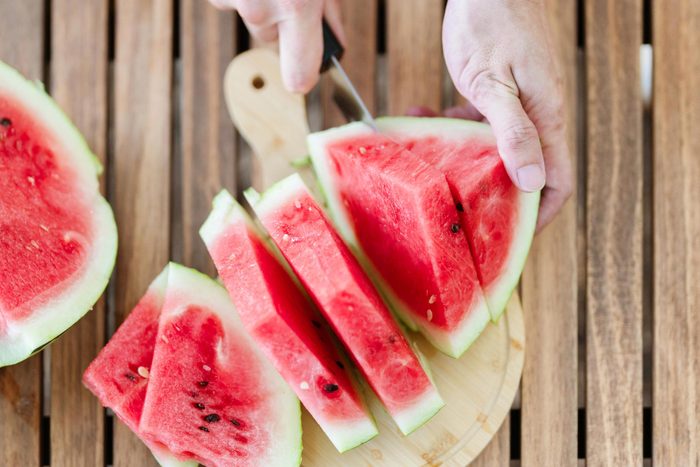
2. Melon-slicing injuries
The delightful duo of watermelon and cantaloupe are summer staples, but they pose their risks. The mixture of heavy fruit and a sharp knife can easily lead to hand injuries. To minimize such accidents, use a cutting board to slice these large fruits into manageable pieces instead of attempting to hold and cut them at the same time.
Lauren Smith, MD, a hand surgeon at Summit Orthopedics, emphasizes in an op-ed the need to seek medical attention swiftly if you cut your palm with a knife. She explains, “The earlier you get in to see someone the better,” because prompt attention to fresh injuries improves the chances of a successful primary repair. This means the damaged tendons, nerves, and arteries can be stitched together, leading to a quicker recovery and rehabilitation.
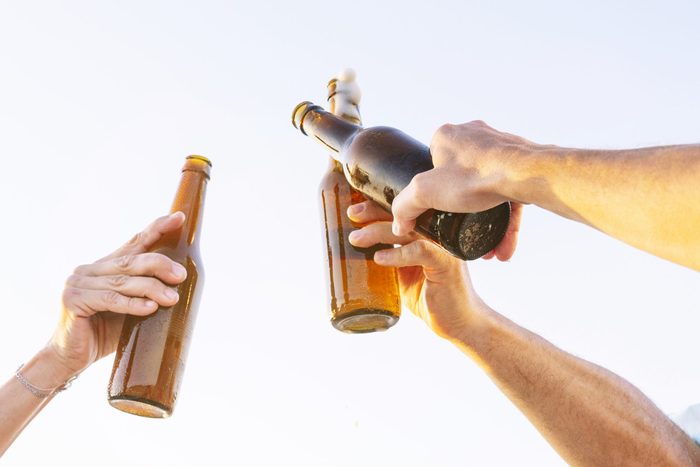
3. Broken glassware
Summer socials often involve chilled drinks, but washing up afterward can pose hidden hazards. Fragile items like beer or wine glasses can easily break and cause deep cuts. It’s advisable to wash these items carefully and avoid letting them pile up in the sink.
Dr. Wolfe suggests some safety measures, such as placing sharp utensils facing down in the dishwasher, not leaving knives in a basin of soapy water, and cleaning up any broken glass or ceramics immediately, using tools or gloves rather than your bare hands.
This Is the Alcoholic Drink That’s Least Harmful to Your Liver, Says a Liver Doctor
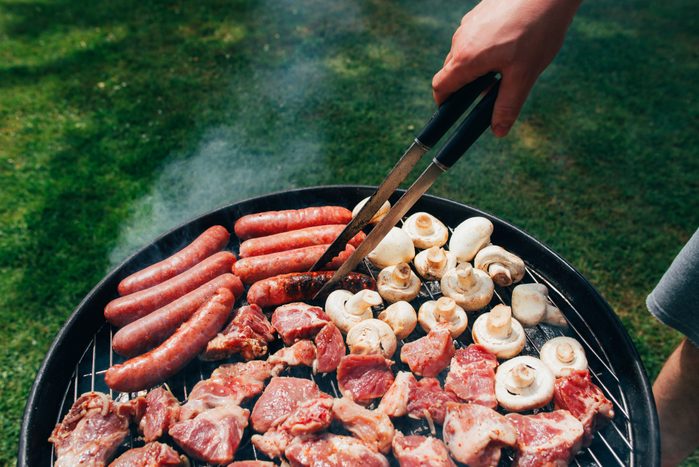
4. Grilling mishaps
Grilling may be a treasured summer pastime, but it’s not without its risks—particularly hand burns. Using long-handled utensils can help keep your hands at a safe distance from the heat, and avoiding flammable liquids to prevent unexpected flare-ups. Have a small inventory of BBQ tools close to the grill before you even fire it up to ensure easy access if the flames get intense at any point.
Michelle Fontaine, MD, an orthopedic surgeon specializing in hand and upper extremity surgeries at Garnet Health highlights in an blog post on the danger of improper knife use during food prep, such as separating frozen burger patties or slicing buns while holding them. Her advice is simple: Always use a cutting board and exercise caution.
9 Mental Health Reasons You Actually Need a Good Cookout, from Therapists

5. Fireworks safety
The Fourth of July might be synonymous with fireworks for many. However, these awe-inspiring spectacles can swiftly turn dangerous, causing severe burns or hand injuries. It’s recommended to entrust the fireworks to the experts and safely enjoy the show from a distance.
While it is advisable for fireworks to be limited to professional displays, if you do decide to use them, keep in mind their potential danger to yourself and others. Here are important safety recommendations outlined by Mark Yuhas, MD in an article for the American Society for Surgery of the Hand:
- Do not allow children to handle fireworks: Children should never handle fireworks, even under supervision.
- Use fireworks outdoors only: Due to their unpredictable nature, using fireworks indoors significantly increases the risk of injury.
- Handle duds with caution: If a firework does not go off, never attempt to relight it. Wait for at least 20 minutes before carefully handling it, and then place it in a bucket of water.
- Light fireworks individually: Only light one firework at a time and designate a single person to be in charge of igniting them.
- Avoid homemade fireworks and follow instructions: Do not use homemade fireworks, and always read the warning labels. Never hold a firework that is not meant to be held in your hand.
- Be prepared and use protective equipment: Do not mix fireworks with alcohol use, have a hose and bucket ready for disposal of fireworks after they have cooled, and wear protective equipment including safety eyewear.
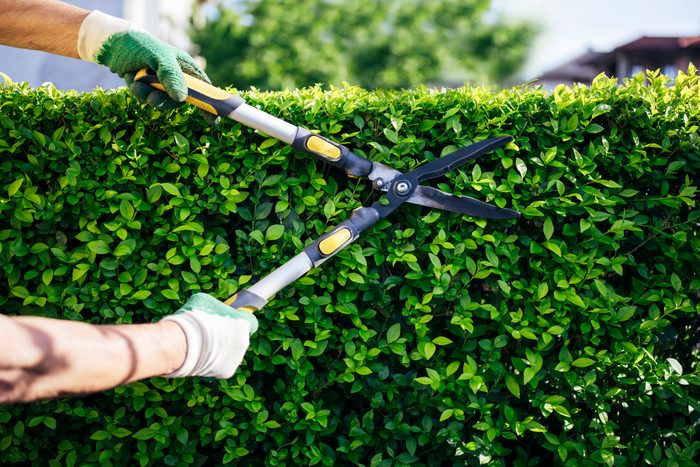
6. Landscaping tips
Engaging in yard work like lawn-mowing or shrub-trimming is another essential summer activity that demands a keen focus on safety. Dr. Fontaine stresses the importance of wearing gloves when operating power tools.
She also cautions on dealing with mower blades: “Never touch mower blades with your hands, even if the engine is off.” Clearing an obstruction could unexpectedly cause the blades to move, leading to severe injuries.
So, before you fire up the grill, slice into a juicy melon, or embark on a gardening project, take a moment to ensure you’re doing so safely. That’ll help keep the fun in your summer.
For the latest in health and wellness, get The Healthy @Reader’s Digest newsletter. Keep reading for more expert advice:
